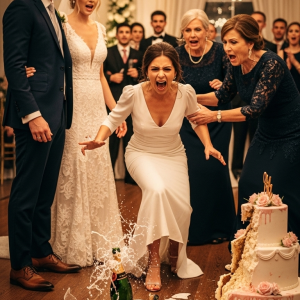I was in the hospital for 51 days after a catastrophic work injury. My wife didn’t visit once. When I finally got her on the phone, she said, “You’re not worth the gas money. Either die fast or heal quick.” My stepson then took the phone and added, “We don’t miss you.” I hung up. A month later, I discharged myself against medical advice and didn’t go home. Yesterday, my sister sent me a video clip of my wife screaming in front of our empty house. “He took everything,” she wailed to no one in particular. “Even the dog.”
I’m 42. I’ve been married to Barbara, 39, for eight years. She brought her son, Gage, into our marriage when he was eight. I really tried with him—built him a treehouse, taught him to fish, the whole stepdad package. Barbara and I weren’t a fairytale, but I thought we were solid. We had our routines, our inside jokes, our life.
It all changed 51 days ago. I was working on-site when a support beam gave way. I ended up with a crushed leg, three broken ribs, and a punctured lung. The doctors said I was lucky to be alive. Lately, I haven’t been feeling particularly lucky.
That first night in the hospital is a blur of pain and medication. I remember calling Barbara, telling her not to bring Gage because it looked bad. She said she’d come first thing in the morning.
Morning came. No Barbara. Day two, no Barbara. I figured she was busy with Gage or work. I called her that evening; I could hear some reality show blaring in the background. She said she’d try to make it tomorrow.
She didn’t. By day five, I was starting to get worried. Not about us, but about her. Had she been in an accident? I asked a nurse if my wife had called. Nothing. One week became two. The nurses started giving me these pitying looks. One of them, Tessa, would sit with me during her breaks. She never asked why my wife wasn’t visiting, but I could see the question in her eyes.
Four weeks in, after my third surgery, my sister Bernice finally broke the silence I was too afraid to acknowledge. She had been visiting almost daily, bringing food and updates about our dog, Curtis.
“Everett,” she started, hesitating. “Do you want me to talk to Barbara? About the fact that she hasn’t visited her husband in the hospital for 28 days?”
Something inside me broke. Not my heart, but the bubble of denial I’d been living in. I asked Bernice to check our joint bank account. Call it a hunch. Two days later, she brought my laptop. What I saw made my blood pressure spike so high the monitors started screaming. Six thousand dollars withdrawn over the past month. ATM withdrawals, transfers to an account I didn’t recognize, and a charge from a jewelry store. Barbara doesn’t wear jewelry.
That night, I made the call that changed everything. I didn’t mention the money, just asked when she was planning to visit. The hospital was only a forty-minute drive.
“Look,” she said, her voice laced with annoyance, “gas is like five bucks a gallon right now, and with everything else…”
“Everything else?” I repeated.
“Well, yeah. I’m basically a single parent right now. Gage has stuff, the house needs work, that leaky roof isn’t fixing itself.”
I reminded her that my sister had offered to pick her up, that friends had offered to drive her, that we had more than enough money for gas—or at least we did.
That’s when she said it. The words that will be forever burned into my memory.
“You’re not worth the gas money, Everett. Either die fast or heal quick, but I’m sick of this in-between.”
I must have made some sound, because Gage got on the phone. “We don’t miss you,” he said, his voice cracking as he tried to sound tough. “Mom’s friend, Sylvio, has been helping with everything.”
Sylvio. Our neighbor. The guy who moved in six months ago and was always offering to help Barbara around the house when I was working late.
I hung up. I just pressed the red button and stared at the ceiling for what felt like hours. The next morning, Tessa, the nurse, brought me an extra pudding cup. “Rough night?” she asked gently.
I told her everything. She listened without judgment, then said something that stuck with me: “Some people show you who they are during the good times. The rest of us have to learn during the bad times.”
The next two weeks were a blur of physical therapy and secret planning. I instructed the hospital staff not to give Barbara any information if she called. She didn’t. I had Bernice bring me documents from our home office. I started tracking our accounts daily. More withdrawals. A charge for two plane tickets to Cancun. Barbara hates the beach.
Day 51. I signed the papers to discharge myself against medical advice. My doctor tried to talk me out of it, but I told him I’d risk more by staying. Bernice picked me up.
“Where to?” she asked as we pulled away from the hospital. “Not home.”
I watched the hospital disappear in the side mirror. 51 days. Not one visit.
“Take me to the Staybridge on Wesley,” I said. “I’ve got plans to make.”
Bernice glanced at me. “You’re going nuclear, aren’t you?”
For the first time in 51 days, I smiled. “No. I’m going to give Barbara exactly what she deserves. Nothing.” And that’s how Operation Empty House began.
That first night in the hotel was rough. The room felt massive and empty compared to the hospital. No nurses, no beeping machines, just me, my thoughts, and a leg that felt like it was on fire. Bernice brought me breakfast the next morning and some neighborhood gossip. Barbara had posted on social media about her “heroic husband fighting for his life,” complete with a five-year-old vacation photo. The post was dated three days after my accident. She never mentioned me again. The absolute gall.
Instead of rage-texting, I made a list. Find a lawyer. Document assets. Get my money back. Get my dog back.
Bernice helped me find a lawyer, Reggie, who specialized in complicated domestic situations. He came to the hotel, dressed in jeans and sneakers, and got straight to the point.
“Divorce or separation?” he asked.
“Divorce,” I said, the answer coming quicker than I expected. “Definitely divorce.”
We spent three hours going through everything. The house, bought before the marriage but refinanced together. The cars. The joint bank accounts. The retirement funds. I showed him the bank statements, the credit card charges, the screenshots Bernice had taken of Barbara’s social media check-ins at restaurants I’d never heard of.
“Here’s where we stand,” Reggie said. “In this state, you’re entitled to half of all marital assets. But you need proof of what exists before she starts hiding things.”
That night, I couldn’t sleep, but this time it was from planning. Barbara thought I was still in the hospital. She had no idea I knew about Sylvio, the money, any of it. That was my advantage.
The next week was a whirlwind of documentation. Bernice went to our house while Barbara was at work and photographed everything. She brought back my important papers and some clothes. I opened new bank accounts, set up direct deposit for my paychecks, and transferred my half of our savings—not a penny more, as Reggie advised. I found a ground-floor apartment online and signed the lease digitally.
I kept up the act with Barbara, calling her twice for less than a minute each time, telling her I was busy with physical therapy. That’s when I found out, through Bernice, that Barbara was planning a “girls’ weekend” in Nashville. The timing was perfect.
I called a moving company and scheduled them for that Saturday, paying extra for packing services. I made a detailed inventory of what was mine before the marriage, what we bought together, and what was exclusively hers. Reggie reviewed it all.
Saturday arrived. Operation Empty House was a go.
Walking into my house after almost 70 days felt surreal. Everything looked the same but felt different. It was spotless, cleaner than I’d ever seen it in eight years of marriage. Apparently, Barbara only broke out the good housekeeping for Sylvio.
My dog, Curtis, came bounding down the stairs, nearly knocking me over. Eighty pounds of pure canine joy. That moment, my dog remembering me after months away, almost broke me.
The movers were efficient. They started with my pre-marriage bedroom set, my office setup, my tools. Barbara’s things stayed untouched. Gage’s room was trickier. I left everything except the gaming setup I’d bought him for Christmas. That came with me.
By 7 p.m., the truck was loaded. I did one final walk-through. I found myself staring at the wedding photo on Barbara’s nightstand. I decided to leave it. Let her deal with that memory.
That night, in the new apartment, surrounded by boxes, the silence was deafening. Barbara had posted pictures from Nashville, all smiles: #girlstrip #bestlife. Meanwhile, her actual house was half empty.
The next evening, my phone exploded. First, a text from Barbara: Where is all our stuff? WHAT DID YOU DO?? Then the calls started. I watched them come in but didn’t answer. An hour later, Bernice sent me a video from her doorbell camera. It showed Barbara standing on our front lawn, screaming at the house.
“He took everything!” the audio was crystal clear. “Even the dog! Who does that?” Curtis, hearing her voice from my phone, just tilted his head, then went back to chewing his bone, completely unbothered.
That night, I had 17 missed calls and four voicemails. I listened to one. “You can’t just disappear with our stuff! This isn’t legal! I’m calling the police!” I forwarded it to Reggie. His reply was swift: Let her call. Everything we did was by the book.
The next morning, I woke up to an email from her. Subject: We need to talk. The body: I know you’re upset, but this is extreme. Call me. We can work this out.
No apology. No acknowledgment. Just Barbara, expecting to control the situation as always. I didn’t respond. Instead, I had Reggie send her a formal letter outlining exactly what I had taken and why, along with the divorce papers.
That afternoon, while sorting through boxes, I found the anniversary card she’d given me two months before my accident. Inside, she’d written: To many more years of building our life together.
I took a photo and texted it to her with a single question: “Was Sylvio already in the picture when you wrote this?”
She read it immediately. The typing bubble appeared, disappeared, then appeared again. Finally, her reply: It’s complicated.
That’s when I knew, without a single doubt, that I’d made the right decision.
Three months have passed since Operation Empty House. Three months of rebuilding my life while watching my old one implode from a safe distance.
After my last update, things got messy. Barbara went from angry texts to tearful voicemails. The emotional whiplash was something to behold. Then, Gage called.
His voice sounded smaller. He asked if he could see me. Bernice thought it was a trap. Maybe she was right, but I had to know.
He showed up the next day. We sat on the balcony of my new apartment, and he told me everything. Barbara and Sylvio had been seeing each other for almost a year. He’d overheard them talking while I was in the hospital, Barbara saying how “convenient” my accident was. The “we don’t miss you” line? Barbara had coached him, promised him a new gaming system if he said it convincingly. He was telling me this now because seeing the half-empty house was a wake-up call. He’d seen who his mom really was.
That night, after Gage left, I sat on my balcony until 2 a.m., nursing a beer. I thought about all the signs I’d missed. The late nights, the “friends” I never met, the gradual distance I’d written off as normal.
Two weeks after my move, Barbara was caught on camera sitting in her car outside my new apartment building for three hours. She left a package at my door: Curtis’s old dog bed and a letter. I didn’t read it.
Then, she called. Her voice was different, subdued. She asked if I wanted to know the truth. No more lies. I don’t know why, but I said yes.
She admitted the affair had started nine months before my accident. She’d been planning to ask for a divorce but couldn’t find the right time. Then I got hurt. A new calculus emerged: if I died, she’d get the insurance money. If I lived, she’d have to split everything. That’s why she never visited. She was hoping I wouldn’t make it.
I should have felt satisfaction, vindication. Instead, I just felt tired. I told her we had nothing left to say to each other.
A week later, Gage asked if he could stay with me on weekends. Surprisingly, Barbara agreed. The first weekend was awkward. By the third, we’d found our rhythm. Friday night movies, Sunday dog walks with Curtis. Small, ordinary moments, building a different kind of relationship.
The divorce proceedings trudged forward. Barbara contested some of the property division, then suddenly dropped it. The house was sold, the assets divided. It was over.
I reconnected with Tessa, the nurse from the hospital. We met for coffee. Nothing romantic, just two people catching up. She told me about a support group for people recovering from major injuries and life changes. Two weeks later, I found myself sitting in a community center meeting room, listening to strangers share their stories. It was oddly comforting.
My leg is healing. The apartment feels like home. Gage visits regularly. Curtis is thriving. And Tessa? We’ve had coffee six times now, dinner twice. Nothing rushed. Just two people getting to know each other properly.
Last week, Barbara sold the house. Bernice sent me a picture of the “SOLD” sign. It should have felt monumental, but it was just another step.
Someone asked me recently if I regret how I handled things, if Operation Empty House was too extreme. Maybe it was. But I don’t regret standing up for myself. In the end, she found an empty house. I found myself again.




